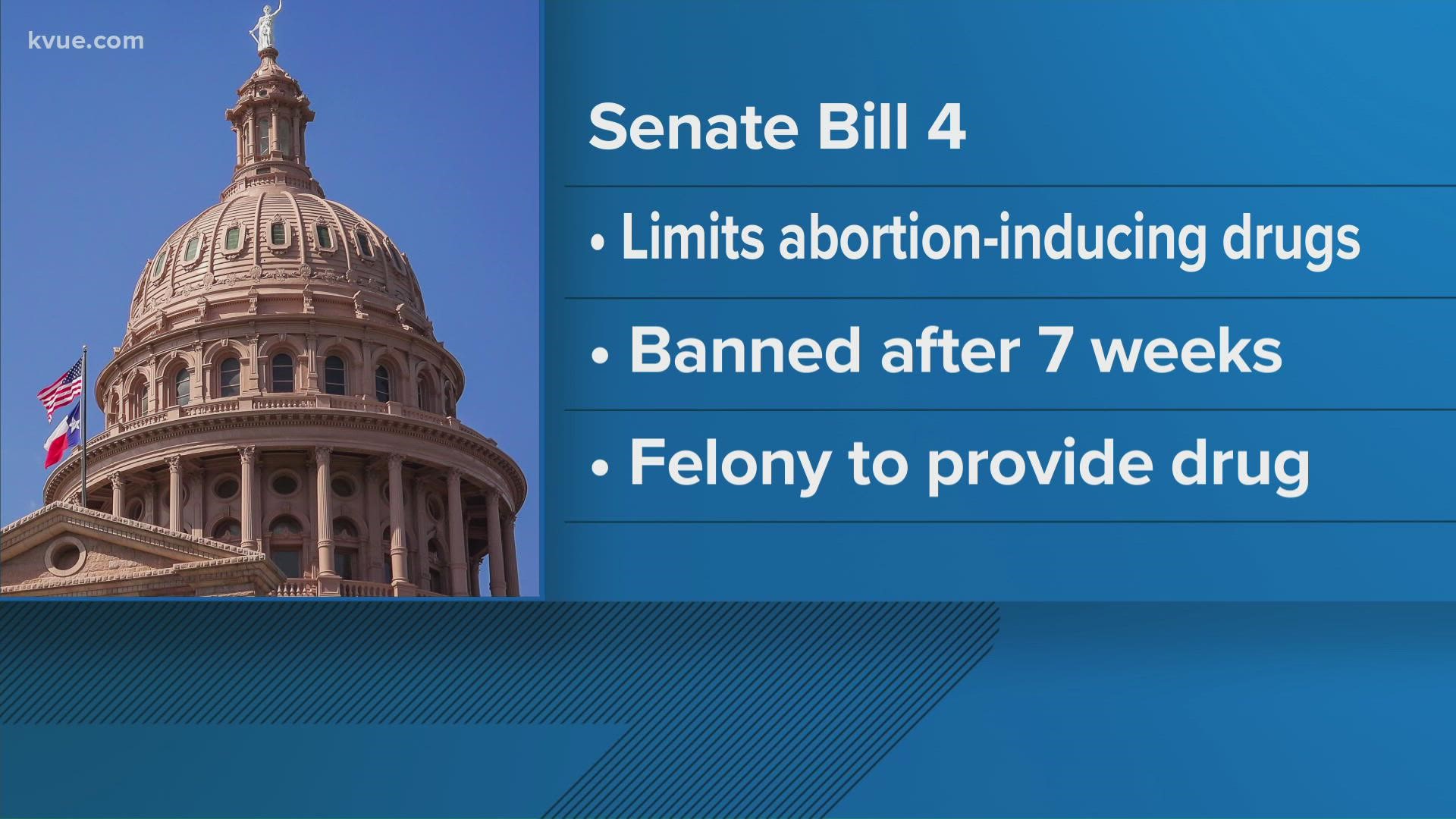AUSTIN, Texas — New Texas laws are taking effect on Dec. 2, including a ban on the most common form of abortions in the state and a controversial election reform bill.
Senate Bill 4, which the Texas Legislature passed during the second special session, goes into effect, limiting abortion-inducing drugs. The law bans the use of drugs for patients who are more than seven weeks pregnant. It also bans the delivery of abortion-inducing drugs through mail or delivery service, which means that women can't order the drugs from across state lines.
The law makes it a felony to provide the medication.
Around 60% of women who are aware of their pregnancy early enough and have an abortion opt to use the pill method over surgery. Prior to this new law, doctors and providers were allowed to give the pills to patients who were up to 10 weeks pregnant. FDA guidelines advise the abortion-inducing medication is safe to use up to 70 days, or 10 weeks.
Since Sept. 1, Texans have been banned from getting an abortion once cardiac activity in a fetus is detected, around six weeks of pregnancy, due to a separate law, Senate Bill 8. That law has been argued in the U.S. Supreme Court and an opinion has yet to be made.
Explaining Texas' election reform law
There's another controversial law that's taking effect on Dec. 2, the election reform law, Senate Bill 1. This law bans 24-hour and drive-thru voting.
The GOP-backed bill was written in response to initiatives Harris County took in 2020 to widen access to voting.
The law grants partisan poll watchers "free movement" at polling places, except for at a voting station when a voter is filling out their ballot. It rules that it's a criminal offense to obstruct a poll watcher's view or distance them in a way that would make observation impossible.
Voters will now be required to provide their driver's license number or the last four digits of their social security number on applications for voting-by-mail ballots.
SB 1 requires voting to happen inside a building. It also bans the distribution of unsolicited mail-in ballot applications.
Second critical race theory law goes into effect
On Sept. 1, House Bill 3979 (HB 3979), one of the so-called critical race theory bills passed by the Legislature this year, went into effect. Now Senate Bill 3 (SB 3) takes over.
SB 3 continues HB 3979's provision that a teacher "cannot be compelled to discuss a currently controversial issue of public policy." But SB 3 changes the requirement for what a teacher must do if they choose to discuss a controversial topic. Instead of having to give equal weight to all sides in any controversy as required in HB 3979, SB 3 states "teachers shall explore the topic objectively and in a manner free from political bias."
Like HB 3979, SB 3 doesn't mention the term "critical race theory."
Due to take effect Dec. 2, social media censorship law put on hold
There is one law, House Bill 20, that Gov. Greg Abbott signed earlier this year that will not take effect on Dec. 2. It has to do with social media censorship.
The Republican-backed bill passed in the second special session and was signed by Gov. Abbott in September.
It comes after social media companies such as Twitter and Facebook removed users, including former President Donald Trump, for what they called misinformation and dangerous speech.
But since the social media platforms are run by private companies, they can regulate who uses their product. U.S. District Judge Robert Pitman said the first amendment allows social media companies to moderate their content. He also said the law is vague due to its definitions of social media platforms and censorship.
Additionally, he said he finds an issue with the part of the law that allows the Texas attorney general to seek an injunction of "potential" violations and not actual violations.
Two other laws going into effect on Dec. 2 are:
- Senate Bill 9, which relates to public school instruction regarding the prevention of child abuse, family violence, dating violence and sex trafficking, as well as the adoption of public school policies to prevent dating violence
- Senate Bill 13, which relates to "dates of certain elections to be held in 2022"
PEOPLE ARE ALSO READING:

